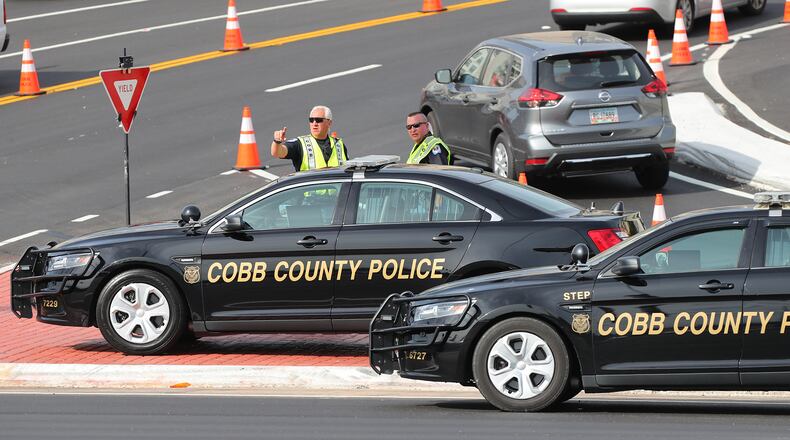Cobb County police must acknowledge and address public perceptions of racism and discriminatory policing, according to a study of the department by the International Association of Chiefs of Police released Thursday.
The study was commissioned by the county last year for $93,000, following two widely-publicized, racially-fraught incidents involving the same officer, who later resigned.
One of those incidents involved County Commissioner Lisa Cupid, the only black member of the commission, who accused the officer of racial profiling after he followed her in an unmarked car.
The study advised the department to collect “race contact and outcome” data—tracking what happens when police officers interact with people of different races— and invest in community policing and public outreach.
Public Safety Director Sam Heaton said the study highlighted many priorities, but changing perceptions of the police will be the most challenging.
“I don’t think it’s impossible by any means but it’s not as easy as something that you can purchase,” Heaton said. “That’s going to be an opportunity for us to get out there more I think.”
The study also highlighted rank and file frustrations with pay, benefits and a perception of poor communication from senior leadership in the department.
The study’s authors concluded that while the department was using crime statistics to appropriately distribute resources, that strategy had created a view within certain communities of unfair treatment.
“Despite the intentional disparate distribution of resources, we did not find any department policing or personnel deployment strategies that appear discriminatory, nor did we find evidence of discriminatory practices within the CCPD,” the report reads.
The report called on the department to engage in a community-oriented “co-production” model of policing, including establishing a formal role for a citizen advisory body.
“This type of a committee can be of great value in helping to establish/maintain transparency and public trust, and also in identifying community wants and needs,” the report reads. “In addition to these important aspects, some communities have used a board of this nature to aid the department in ensuring accountability for the actions and/or inactions of agency staff.”
Commissioner Cupid began pushing for a citizen oversight board in the wake of her run-in with the undercover officer, but the initiative failed to gain support from the rest of the board.
Cupid called the recommendations contained in the report “helpful.”
“I do think that the report supports the concerns that I shared and seems to be consistent with some of the suggestions that I had,” she said.
The report urged the department to prioritize diversity in recruitment. The study found that CCPD sworn staffing is predominately white at 85 percent, while Cobb County is 67 percent white. The department is overwhelmingly male as well, according to the study.
The study’s authors also discussed the opening of SunTrust Park, the new home of the Atlanta Braves, calling it “no small undertaking,” and adding that it will likely “place a great strain on the available resources of the CCPD.”
The Atlanta Journal-Constitution recently reported that Cobb taxpayers will shoulder an estimated $900,000 a year to provide public safety and traffic control outside the stadium, a cost covered by the team when it was in Atlanta.
“To begin this discussion, it is important to recognize that major league sports teams are, first and foremost, profit-centered business enterprises,” the report reads. “We do not make this statement in a derogatory sense, but rather to frame the issue appropriately.”
The report said security expenses should be considered in negotiations with team authorities.
The study comes at a key moment for the department, with the recent appointment of a new, interim county manager and the impending appointment of a new police chief.
The county initially balked at releasing a draft of the study given to them by IACP. County officials had concerns about the originality of the report. Heaton said his department had asked for clarification on the police study after noticing passages that were extremely similar to a report the IACP had prepared for another city.
After further review, he said the similarities likely reflect the fact that different police departments face similar problems. Earlier this year, commissioners complained that a salary study from the Archer Group for which the county paid more than $300,000 included boilerplate language from studies the consultant had done for other metro Atlanta counties.
“Looking through (the IACP report), I’m confident that the report is good and it is for Cobb,” Heaton said. “It’s not going to be one of those things where it hits our desk and three days later we’ve completed all these recommendations. It’s an opportunity for us to identify what is needed based on our police department, our board and our communities.”
In other Cobb news:
MYAJC.COM: REAL JOURNALISM. REAL LOCAL IMPACT.
The AJC's Meris Lutz keeps you updated on the latest happenings in Cobb County government and politics. You'll find more on myAJC.com, including these stories:
Never miss a minute of what's happening in Cobb politics. Subscribe to myAJC.com.
About the Author
Keep Reading
The Latest
Featured



